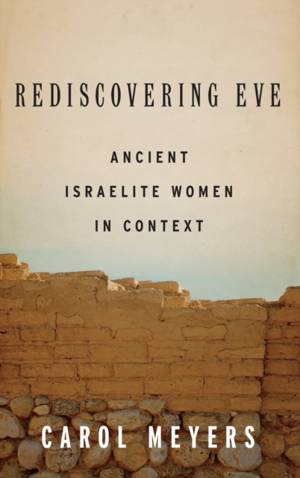
Door een staking bij bpost kan je online bestelling op dit moment iets langer onderweg zijn dan voorzien. Dringend iets nodig? Onze winkels ontvangen jou met open armen!
- Afhalen na 1 uur in een winkel met voorraad
- Gratis thuislevering in België vanaf € 30
- Ruim aanbod met 7 miljoen producten
Door een staking bij bpost kan je online bestelling op dit moment iets langer onderweg zijn dan voorzien. Dringend iets nodig? Onze winkels ontvangen jou met open armen!
- Afhalen na 1 uur in een winkel met voorraad
- Gratis thuislevering in België vanaf € 30
- Ruim aanbod met 7 miljoen producten
Zoeken
€ 164,45
+ 328 punten
Uitvoering
Omschrijving
This groundbreaking study looks beyond biblical texts, which have had a powerful influence over our views of women's roles and worth, in order to reconstruct the typical everyday lives of women in ancient Israel. Carol Meyers argues that biblical sources alone do not give a true picture of ancient Israelite women because urban elite males wrote the vast majority of the scriptural texts. Also, the stories of women in the Bible concern exceptional individuals rather than ordinary Israelite women. Drawing on archaeological discoveries and ethnographic information as well as biblical texts, Meyers depicts Israelite women not as submissive chattel in an oppressive patriarchy, but rather as strong and significant actors within their families and in their communities. In so doing, she challenges the very notion of patriarchy as an appropriate designation for Israelite society.
Specificaties
Betrokkenen
- Auteur(s):
- Uitgeverij:
Inhoud
- Aantal bladzijden:
- 312
- Taal:
- Engels
Eigenschappen
- Productcode (EAN):
- 9780199734559
- Verschijningsdatum:
- 27/12/2012
- Uitvoering:
- Hardcover
- Formaat:
- Genaaid
- Afmetingen:
- 239 mm x 160 mm
- Gewicht:
- 649 g

Alleen bij Standaard Boekhandel
+ 328 punten op je klantenkaart van Standaard Boekhandel
Beoordelingen
We publiceren alleen reviews die voldoen aan de voorwaarden voor reviews. Bekijk onze voorwaarden voor reviews.











